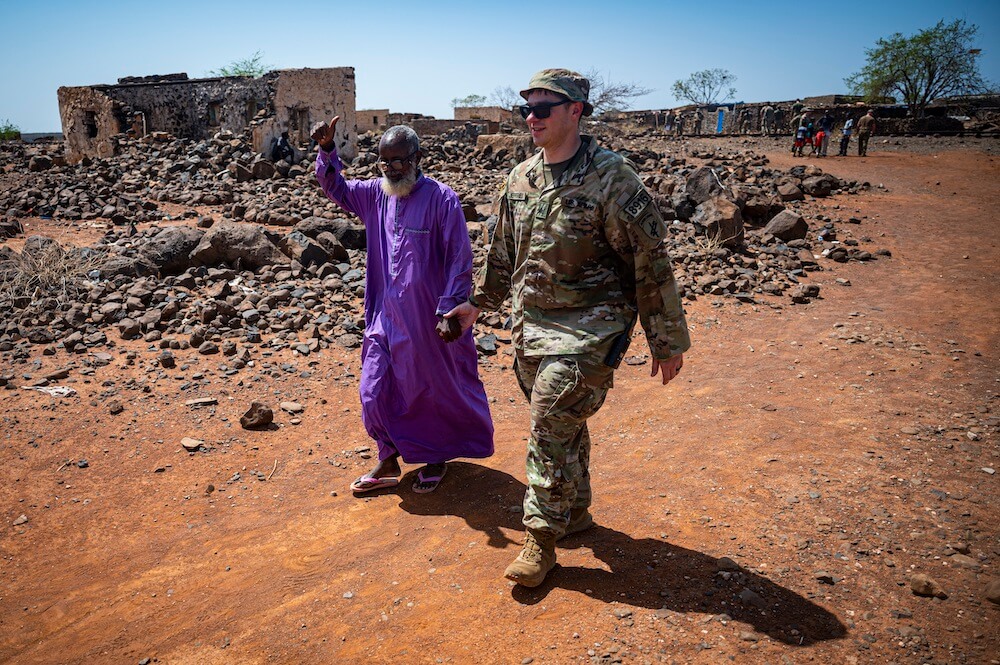Soldiers are deploying for a series of nine-month rotations to strengthen partnerships across the African continent.
Civil affairs soldiers have played a strategic role in the military since World War II. Like a military version of the Peace Corps, civil affairs soldiers today are known as ‘bridge builders.’ According to Capt. Iesha Taylor, “We are often referred to as bridge builders in regards to our focus on connecting the local populace with host nation forces.”
Serving as an operations officer within the 489th Civil Affairs Battalion. Taylor further defines the civil affairs soldiers’ responsibilities.
“Civil affairs provides foreign humanitarian assistance, as well as populace and resources control which assists nations with disaster relief, reconstruction efforts, and increasing medical capabilities,” she told Reserve + National Guard Magazine.
Made up entirely of Army reservists, the 489th Battalion currently is in the middle of a nine-month deployment based out of Djibouti. Soldiers are spread out across the continent of Africa conducting civil affairs operations in various countries including East, West, and North Africa. The battalion consists of soldiers from more than 20 different states, with each hand-selected for this mission.
“This is a combat deployment, and one of the few since the Afghanistan war. We all came together for the first time on deployment, and had to quickly mesh together, develop processes, and conduct operations,” Taylor said.
In executing its vital missions, the 489th CA Battalion supports the U.S. Army Southern European Task Force, Africa (SETAF-AF), based in Vicenza, Italy.
“Reserve soldiers are the mainstay of SETAF-AF’s mission, and as Reserve Civil Affairs Soldiers, we play a very large role,” Staff Sgt. Allan “Trey” Jefferies, a member of the 489th, said.
Jefferies, a reservist since 2009, was drawn to civil affairs for the opportunity to learn a variety of valuable skills, like problem solving, relationship building, and project management, to name a few.
Given its breadth of responsibilities, the civil affairs battalion is made up of many talented individuals, like 1st Lt. Shashank Adhikari. Originally from Nepal, he moved to the U.S. when he was 18, and now lives in Maryland.
RELATED: AFRC brings A10s to South America for annual training exercise
“I chose to be signal officer because I enjoy the challenges of the IT world, and it closely aligns with my educational and professional background,” he said.
Adhikari further explains how his personal and professional goals interlink.
“Military duties come with a big commitment, but serving doesn’t mean putting personal growth on hold. Flexibility is essential when it comes to balancing military life with personal life, and I always try to be flexible with my working conditions. The military has tons of resources to enhance personal growth, so you just need to be proactive to find the resources you want.”
To that end, Adhikari is working on his master’s in his spare time in Africa, in between working out and playing soccer.
“This deployment has been a great experience for me. I’m getting leadership roles and experience which can be very useful in my military and civilian career down the road,” he added.
Using her college degree in science, Texas native Staff Sgt. Vanessa Castillo was immediately drawn to civil affairs just before enlisting, and just after attending a battle assembly with a local unit in Lubbock, Texas.
“They had us going around town conducting assessments and interacting with role players, while gathering information,” she said. “I loved how it was hands on work, first getting out to make assessments, then coming together to make plans. That experience, gave me a small view of what a civil affairs specialist does.”
Civil affairs medical personnel
A variety of medical personnel are comprised within the 489th CA Battalion, like Sgt. Ronald Link, who enlisted as a combat medic healthcare specialist.
“I chose to be a medic because I have wanted to help others in need for as long as I can remember,” he said.
This desire to help others parallels the Georgia native’s civilian job as an advanced emergency medical technician where he worked in a pre-hospital care setting for emergency medical services.
“After conducting numerous missions here in Africa, I’ve concluded that civil affairs complements being a healthcare provider quite well.”
Link cites interpersonal skills, critical/abstract thinking, and resource management as a few of the numerous overarching attributes in both the civilian and military sectors.
Working in EMS on the civilian side has allowed Link to become a more versatile medic.
“The training and education I received through the Army are based more on trauma,” he says. “In contrast, civilian pre-hospital medicine is more encompassing of both traumatic injuries and medical-related illnesses; though in my civilian experience, there is more emphasis on the latter. The world of medicine is ever evolving, and my involvement on both sides is advantageous. It has been gratifying to integrate my healthcare experience into civil affairs.”
The sergeant adds, “I’ve had several opportunities to conduct medical knowledge exchanges with our foreign partners, and most recently assisted with promoting herd health through vaccination and deworming of livestock.”
Taylor, who is a therapist in the civilian sector, is a former medical services soldier with a background in mental health and crisis intervention. She explains her attraction to civil affairs.
“I gravitated to civil affairs due to the multitude of opportunities. Some of those opportunities included: Enhancing collective teamwork, positively impacting lives, working and collaborating with partner nations, and alleviating chaos and promoting stability in our partner communities and countries.”

